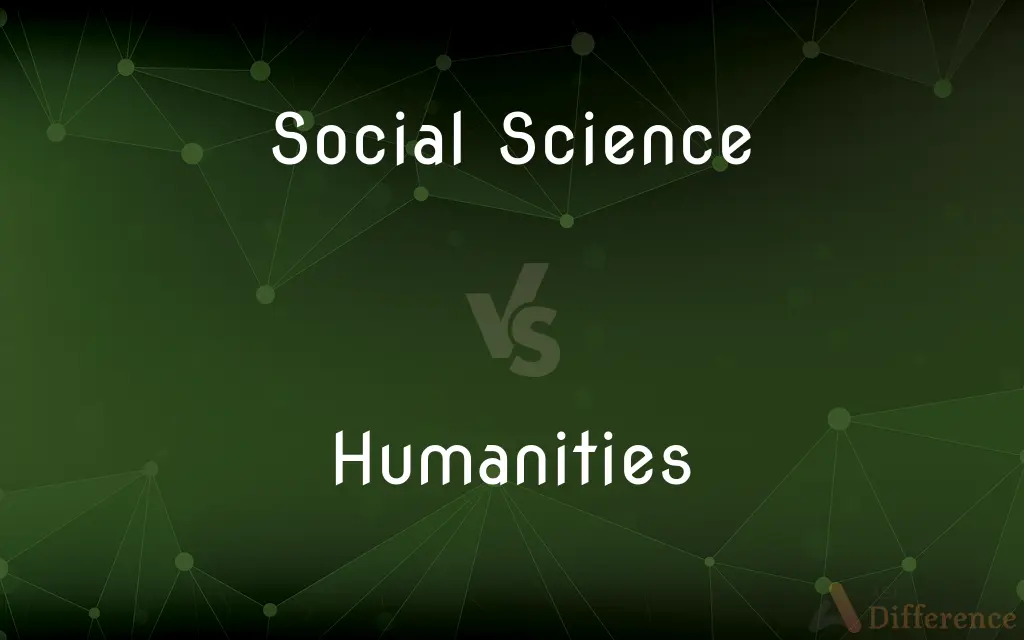Social Science vs. Humanities — What's the Difference?
Edited by Tayyaba Rehman — By Fiza Rafique — Published on January 7, 2024
Social Science studies human behavior and societies, while Humanities explore human culture, arts, and philosophy.

Difference Between Social Science and Humanities
Table of Contents
ADVERTISEMENT
Key Differences
Social Science revolves around understanding human behavior, social structures, and how societies function. It employs systematic methods and empirical data to analyze and draw conclusions about societal phenomena. From anthropology to sociology, Social Science delves deep into various aspects of human interactions and the institutions they create.
Humanities, in contrast, primarily focus on human culture, thought, and creativity. They encompass disciplines such as literature, history, philosophy, and the arts. Humanities allow for a broader interpretation and understanding of human experiences throughout time, offering insights into values, beliefs, and traditions.
Social Science often adopts a more empirical and objective approach. Researchers might use surveys, experiments, and observational methods to derive insights about societal trends and behaviors. Humanities, however, often prioritize subjective interpretations, critical thinking, and a deep dive into texts, artworks, and historical documents.
Another distinction between Social Science and Humanities lies in their application. While both fields aim to understand human experience, Social Science often seeks solutions to societal issues, informs policies, and predicts future behaviors. In contrast, Humanities primarily enrich our understanding and appreciation of culture, fostering empathy, and critical thought.
Both areas, Social Science and Humanities, are indispensable to a comprehensive understanding of human existence. They complement each other by offering different lenses through which we can perceive, interpret, and respond to the world around us.
ADVERTISEMENT
Comparison Chart
Primary Focus
Human behavior and societal structures.
Human culture, thought, and creativity.
Methodology
Empirical and systematic.
Interpretative and analytical.
Disciplines Included
Anthropology, Sociology, Psychology, etc.
Literature, History, Philosophy, Arts, etc.
Aim
Understand, predict, and address societal issues.
Appreciate and interpret human culture and experience.
Perspective
Often objective.
Often subjective.
Compare with Definitions
Social Science
Social Science predicts human trends.
Through Social Science, demographers forecast population changes.
Humanities
Humanities delve into human arts and culture.
Studying ancient sculptures is a pursuit within the Humanities.
Social Science
Social Science informs policy-making.
Social Science insights can guide governmental decisions.
Humanities
Humanities encompass philosophical studies.
Philosophy, a branch of the Humanities, questions human existence.
Social Science
Social Science investigates human behaviors.
Psychology, a branch of Social Science, delves into human cognition.
Humanities
Humanities critically analyze texts and art.
Critiquing a novel's themes is a task in the Humanities.
Social Science
Social Science examines societal structures.
The study of economic trends is a facet of Social Science.
Humanities
Humanities interpret human experiences.
Literary analysis is a hallmark of the Humanities.
Social Science
Social Science employs empirical methods.
Data collection and analysis are fundamental in Social Science research.
Humanities
Humans considered as a group; the human race.
Humanities
The condition or quality of being human.
Humanities
The quality of being humane; benevolence.
Humanities
A humane characteristic, attribute, or act.
Humanities
The languages and literatures of ancient Greece and Rome; the classics.
Humanities
Those branches of knowledge, such as philosophy, literature, and art, that are concerned with human thought and culture.
Humanities
Plural of humanity
Humanities
(obsolete) classical studies: the study of Ancient Greek and Latin, their literature, etc.
Humanities
The study of language, literature, the arts, history, and philosophy, sometimes including religion.
Humanities
Studies intended to provide general knowledge and intellectual skills (rather than occupational or professional skills);
The college of arts and sciences
Humanities
Humanities foster empathy and understanding.
Through the Humanities, we can relate to historical events and emotions.
Common Curiosities
What is the main focus of Social Science?
Social Science focuses on understanding human behavior and the functioning of societies.
Can the two fields overlap in any way?
Yes, topics like cultural anthropology or historical sociology can bridge both Social Science and Humanities.
How do Humanities differ from Social Science in approach?
Humanities interpret and appreciate human culture, while Social Science employs empirical methods to understand societal trends.
Why are Humanities important?
Humanities enrich our understanding of human experiences, foster empathy, and promote critical thinking.
What are some disciplines within Social Science?
Anthropology, sociology, and psychology are among the disciplines within Social Science.
Which field is more objective: Social Science or Humanities?
Social Science often adopts a more objective, data-driven approach, while Humanities prioritize subjective interpretations.
Are the arts a part of Social Science?
Arts are primarily studied within the Humanities, focusing on appreciation and interpretation.
Which field might explore ancient civilizations?
Both can, but while Social Science might focus on societal structures, Humanities would delve into art, philosophy, and literature.
Is history a part of Social Science or Humanities?
While history can be approached empirically as a Social Science, it's traditionally classified under Humanities.
Is literature a part of Social Science?
No, literature is primarily a subject within the Humanities.
How do Humanities contribute to society?
Humanities deepen our appreciation of culture, values, and traditions, shaping a more empathetic society.
Do Humanities employ any empirical methods?
While Humanities mainly use interpretative methods, they can sometimes incorporate empirical data for broader insights.
Can a topic be approached both as a Social Science and Humanities study?
Yes, depending on the perspective and methodology adopted, many topics can be explored from both angles.
Which field would study economic systems?
Economics, a Social Science, would analyze economic systems.
How do Social Sciences help policymakers?
Social Science research can inform policies by offering insights into societal behaviors and needs.
Share Your Discovery

Previous Comparison
PSI vs. PSIG
Next Comparison
Partly Cloudy vs. Partly SunnyAuthor Spotlight
Written by
Fiza RafiqueFiza Rafique is a skilled content writer at AskDifference.com, where she meticulously refines and enhances written pieces. Drawing from her vast editorial expertise, Fiza ensures clarity, accuracy, and precision in every article. Passionate about language, she continually seeks to elevate the quality of content for readers worldwide.
Edited by
Tayyaba RehmanTayyaba Rehman is a distinguished writer, currently serving as a primary contributor to askdifference.com. As a researcher in semantics and etymology, Tayyaba's passion for the complexity of languages and their distinctions has found a perfect home on the platform. Tayyaba delves into the intricacies of language, distinguishing between commonly confused words and phrases, thereby providing clarity for readers worldwide.












































